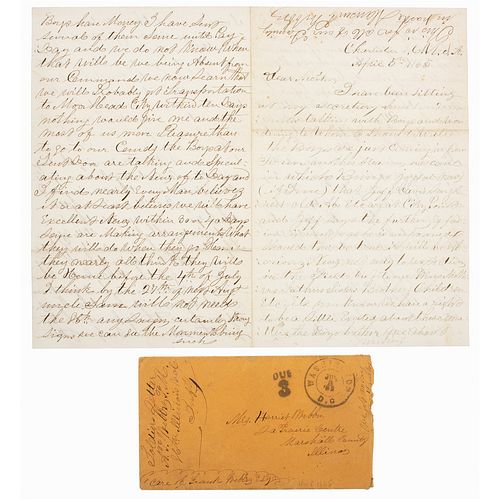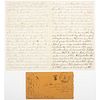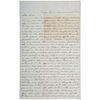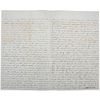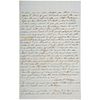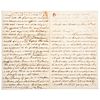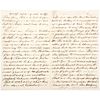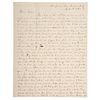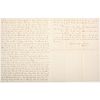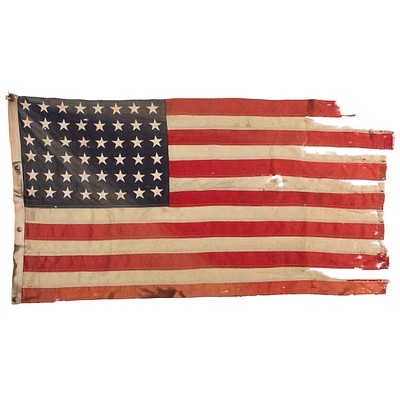Illinois in the Civil War: Lot of Letters from IL Regiments
About Seller
6270 Este Ave.
Cincinnati , OH 45232
United States
With offices in Cincinnati, Cleveland and Denver, Cowan’s holds over 40 auctions each year, with annual sales exceeding $16M. We reach buyers around the globe, and take pride in our reputation for integrity, customer service and great results. A full-service house, Cowan’s Auctions specializes in Am...Read more
Two ways to bid:
- Leave a max absentee bid and the platform will bid on your behalf up to your maximum bid during the live auction.
- Bid live during the auction and your bids will be submitted real-time to the auctioneer.
Bid Increments
| Price | Bid Increment |
|---|---|
| $0 | $25 |
| $500 | $50 |
| $1,000 | $100 |
| $2,000 | $250 |
| $5,000 | $500 |
| $10,000 | $1,000 |
| $20,000 | $2,500 |
| $50,000 | $5,000 |
| $100,000 | $10,000 |
About Auction
Jun 26, 2020
Cowan's Auctions is delighted to present the June 26 American Historical Ephemera and Photography Auction, including 55 lots devoted to the African American experience, over 175 lots dating from the Civil War Era, and more than 60 lots documenting life in the American West. Cowan's Auctions dawnie@cowans.com
- Lot Description
Illinois in the Civil War: Lot of Letters from IL Regiments
Lot of 24 Civil War letters written by soldiers serving in Illinois infantry, cavalry, and artillery regiments including one written by Medal of Honor recipient Alansen P. Webber of the 86th Illinois Infantry. The archive includes letters written over the course of the war with the earliest dated September 27, 1862, and the latest June 11, 1865. The letters reveal the multitude of soldiers’ experiences and include fascinating battle content from the Western Theater including Fort Henry, Island Number Ten, Shiloh (referred to here as Pittsburg Landing), the Siege of Corinth, and Vicksburg.
Of particular note is a letter penned near the end of the war by Medal of Honor recipient Alansen P. Webber (1828-1902, note his given name is spelled variously in records as Alason, Alanson, Alonzo. Here, Webber spells his name clearly as Alansen). Webber enlisted on Aug. 13, 1862 and mustered into Field & Staff of the 86th Illinois Infantry on Aug. 27, 1862, as a Principle Musician and was promoted later to Fife Major. On June 27, 1865, Webber distinguished himself at Kenesaw Mountain by voluntarily advancing as a sharpshooter and repulsing the enemy allowing his wounded comrades to return to Union lines and for temporary defenses to be constructed. In an April 5, 1865 letter to his mother Harriet, Webber details the excitement of the camp at the news that the war may be at a close. His response is one of cautious optimism, “Another steamer has come in which brings joyful news (if true) that Jeff Davis, Longstreet, Old Abe, etc. are at City Point and Jeff says that the further effusion is useless as he is overpowered. Should this be true it will be glorious news not only to us soldiers in the field but to our wives, mothers, fathers, sisters, brothers, children, etc. etc. You know we have a right to be a little excited about these matters. The boys bother me about writing. Some are climbing tents, some throwing hats, etc, etc, but we have been fooled so often many of us do not propose to make much of a stir until confirmed. But we are ripe for big news and perhaps before you receive these lines great results will have been attained such as will cause the people of the U. States to rejoice.” His words proved true as Lee would surrender at Appomattox just 4 days later.
James Fortiner of the 2nd Illinois Cavalry, Company D arrived in the immediate aftermath Battle of Fort Henry on February 6, sailing upriver from Cairo, IL. He writes to his fiancé Emma on February 8, 1862, just two days after the battle recounting the carnage, “There has been another hard battle fought by our gun boats up the Tennessee River at Fort Henry. They had a bloody time. We was all ordered up there but the fight commenced in the morning and we were just two hours too late to have a hand in it. But it was an awful sight to look at the battlefield after we got in the fort for the ground was covered with blood and strewn with the dead and wounded and mangled bodies, mostly Secess. Their large guns, 24 in number, all busted and broken by our gun boats. We came back last night, which was the 7th, bringing their flag and their general with 800 prisoners to Cairo with us. We were received by the ladies and gentlemen of Cairo with over a hundred applauding, and this morning we returned to our respective place in Kentucky.” The Battle of Fort Henry was one of the first major victories for the Union in the Western Theater and strategically opened the Tennessee River to Union traffic south of the Alabama border.
In two letters, dated March 8 and April 8, 1862, an unidentified soldier named Frank writes to his wife Sallie relating extensive details of Island Number Ten near New Madrid, MO. The island in question is positioned at the base of a tight double turn in the river and held by the Confederates. Frank writes in his first letter of the coalescing of Union forces under General Pope and of the Confederates’ position, “rebel troops they are however fortified on Island No. 10 above New Madrid, and below Columbus with all the heavy artillery they had at Columbus and until our gun boats shell them from Island No 10, the rebel gun boats will keep Pope’s division from entering New Madrid as it would cut them off – thus it stands at present – a day or two and the programme may take a change – our forces occupy Columbus.” In his second letter home, he quite accurately predicts the outcome of the Island, “Island No. 10 has not yet been taken, but I think a week from to day will tell a different tale – unless the rebels should evacuate. - Pope’s forces will before five days have crossed the river and cut off their retreat – this is merely my opinion – and five days the extent of the time before it will have been accomplished. Then old Deacon Foote will wake up & with twenty-fold energy pour on to the Island and surrounding rebel batteries such a shower of shot and shell that it will be impossible for them to withstand its effect. Retreat will be cut off and unconditional surrender the consequences. The Island will fall you can rest easy on that score. There will I think be forces left on this side, here, which place 16th will be of course as yet uncertain – may cross the river and may be left here with others on this side."
Theodore P. Kellogg of Co. I of the 13th Illinois Infantry wrote to his betrothed Sarah on March 7, 1863, in the aftermath of the Vicksburg Campaign and the Battle of Chickasaw Bayou, “Our Brigade (Gen. Frank Blair’s) was in the advance. On the 28th we came on them again & drove them across an open field into their fortifications & the same day we skirmished with them across a bayou for about three hours. It was here that we lost our beloved Co. John B. Wyman & it was a heavy blow for us. We all respected & loved him & no one can fill his place in our minds. He was a brave man & a gentleman. On the 29th the charge took place of which you have doubtless seen an account. In that fight our Reg’t lost two hundred & four men. It was a terrible battle & I want never to see such another one. I am willing to fight but I want to see some chance of success.” His regiment had arrived at Vicksburg prior to the siege in May, he writes of the fortifications, “Vicksburg is a fine looking town at a distance…The Rebel works opposite us are very strong & mount a large number of guns; there will be an awful struggle before this stronghold is taken. Our troops have thrown up an earthwork at the mouth of the canal about a mile & a half from the Rebel forts. That canal costs us a great deal of work. About five thousand men labor on it daily & it is not near finished yet. Almost every day the Rebels amuse themselves & practice target shooting by throwing shot & shell at the men working in the canal. No one has been hurt yet by them but they come pretty close sometimes.”
Isaac M. Brown, of Co. I of the 77th Illinois Infantry, wrote to his niece Fanny on May 28, 1863, near the conclusion of the formal Siege on Vicksburg. He describes the second unsuccessful assault on May 22, "We have now besieged Vicksburg ten days and made one attempt to take it by storm. In this attempt we failed, the first this army has received since crossing the Mississippi four weeks since. In this time five battles have been fought, twenty thousand Rebels killed, wounded or taken prisoners, one hundred and twenty-four pieces of cannon taken, and immense quantities of Confederate munitions of war and other property taken or destroyed. This is exclusive of what has been done at Vicksburg. No one doubts that Vicksburg will be taken, it is regarded only as a question of time. They may surrender today – they may hold out two weeks though few think it possible for them to sustain themselves that length of time. The Rebels have made two attempts to break through our lines but have been driven back with severe loss. They have also offered to surrender on certain conditions (so we hear) but Gen. Grant demands an unconditional surrender. In this the army sustains him to fight for it.” Brown gives a full account of those in his regiment that were killed, wounded, and taken prisoner, several of whom are not listed in the military records as having been captured.
Four letters written by John B. Duncan to his wife are included in the archive. He served as Captain of Co. H of the 32nd Illinois Infantry and was a veteran of the Mexican War. He wrote of his unit's march toward Corinth (May 7, 1862), the Siege of Corinth (May 16, 1862), and what he has heard of the Battle of Shiloh (June 8, 1862). In his final letter included here he lists several deserters and expresses his desire to see them punished. Much of the letter is devoted to writing for his disdain and hatred for African Americans and that he fights for the Constitution, rather than the abolishment of slavery, "So far as fighting to free the negroes is concerned there is no one so far as I know, except it is a few abolitionists, who has an intention or even the most distant idea of attempting to free the negroes, holding that as any part of the object or purpose of the war. But as we are fighting for the purpose of upholding the Constitution and enforcing the laws and if traitors will run the risk of losing their slave property by taking up arms against the government which has protected them always in the enjoyment of that property, and the consequence of their rebellion is the loss of their slaves, they have nobody to blame but themselves." Duncan would not survive the war, dying from wounds on July 18, 1864.Various - expected creases with some spotting and toning. For condition report on specific letters or archive, please contact www.cowans.com.Condition
- Shipping Info
-
Buyers are required to pay for all packing, shipping and insurance charges. Overseas duty charges are the responsibility of the successful Bidder. Be aware that for larger and/or valuable items, shipping charges can be substantial. - If there is no shipping amount on listed your invoice, you will need to make arrangements to pick up or ship your purchase through an alternative shipping company. Our shipping department can be contacted at 513.871.1670 (ext. 219) or email shipping@cowans.com. - Shipping charges include insurance for your order while in transit. If you have private insurance we will adjust your charge to include only packing and shipping. - Please allow 14 – 21 days after payment to package and ship your purchase as carefully as possible.
-
- Buyer's Premium



 EUR
EUR CAD
CAD AUD
AUD GBP
GBP MXN
MXN HKD
HKD CNY
CNY MYR
MYR SEK
SEK SGD
SGD CHF
CHF THB
THB